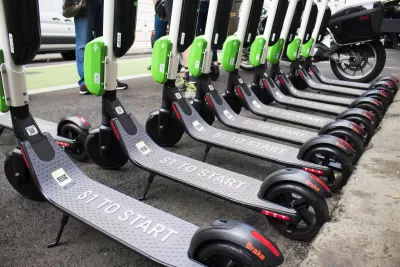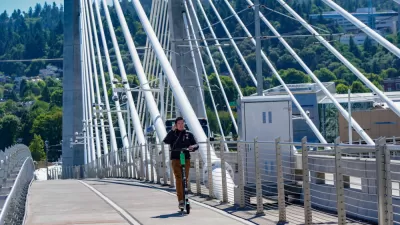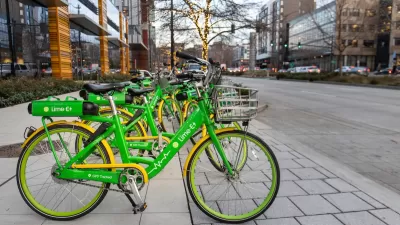City taxes and fees on shared bikes and scooters are, on average, much higher per mile than similar taxes on cars.

A new study from Portland and Sonoma state universities and Lime, shows that shared micromobility modes include about $0.70 per mile in city fees and taxes, a number much higher than the $0.03 per mile paid by the average driver, reports Gersh Kuntzman in Streetsblog USA.
The study highlights how municipal fees are stifling micromobility and making it, in some cases, more expensive than driving. “The report found that governments across North America take on average nearly 14 percent of fare revenues in the form of sales taxes from riders, who are in a sense double-taxed because cities often also charge an operating fee to shared micromobility companies, a fee that is typically passed onto the consumer.”
The report notes that shared micromobility fees and taxes are higher than other modes of travel, including personal vehicles and ride-hailing.
While the authors did not recommend optimal fee amounts, they concluded, “We recommend that cities align fees with overarching municipal transportation [sustainability] goals and use well-established principles of taxation and administration to determine the structure of fees.”
FULL STORY: Report: Cities are Undermining Sustainable Mobility with Fees and Taxes

Planetizen Federal Action Tracker
A weekly monitor of how Trump’s orders and actions are impacting planners and planning in America.

Congressman Proposes Bill to Rename DC Metro “Trump Train”
The Make Autorail Great Again Act would withhold federal funding to the system until the Washington Metropolitan Area Transit Authority (WMATA), rebrands as the Washington Metropolitan Authority for Greater Access (WMAGA).

The Simple Legislative Tool Transforming Vacant Downtowns
In California, Michigan and Georgia, an easy win is bringing dollars — and delight — back to city centers.

The States Losing Rural Delivery Rooms at an Alarming Pace
In some states, as few as 9% of rural hospitals still deliver babies. As a result, rising pre-term births, no adequate pre-term care and "harrowing" close calls are a growing reality.

The Small South Asian Republic Going all in on EVs
Thanks to one simple policy change less than five years ago, 65% of new cars in this Himalayan country are now electric.

DC Backpedals on Bike Lane Protection, Swaps Barriers for Paint
Citing aesthetic concerns, the city is removing the concrete barriers and flexposts that once separated Arizona Avenue cyclists from motor vehicles.
Urban Design for Planners 1: Software Tools
This six-course series explores essential urban design concepts using open source software and equips planners with the tools they need to participate fully in the urban design process.
Planning for Universal Design
Learn the tools for implementing Universal Design in planning regulations.
Smith Gee Studio
City of Charlotte
City of Camden Redevelopment Agency
City of Astoria
Transportation Research & Education Center (TREC) at Portland State University
US High Speed Rail Association
City of Camden Redevelopment Agency
Municipality of Princeton (NJ)





























